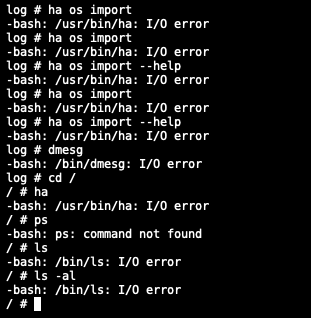My Raspberry Pi 5 (16GB) Running Home Assistant OS frequently stops working. It occurs seemingly random every few weeks.
I cannot access the Home Assistant web page using my browser. The Home Assistant App is barely usable, not useful information, such as log files is accessible.
I cannot connect via SSH.
All functionality, such as Zigbee and Z-wave communication is not working anymore.
When connecting a monitor the console output shows an endless amount of the following messages:
Buffer I/O error on dev nvme0n1p3, logical block 17399, async page read
erofs: (device nvme0n1p3): erofs_read_inode: failed to get inode (nid: 2227159) page, err -5
systemd-journald[130]: Failed to write entry to /var/log/journal/<id>/system.journal (21 items, 685 bytes) despite vacuuming, ignoring: Input/output error
The only solution to get out of this situation is to hard reboot the Raspberry Pi.
The home-assistant, host and supervisor logs, accessible after rebooting show no useful information.
Setup currently in use:
HW:
Raspberry Pi 5, 16 GB
Raspberry Pi 45W USB-C Power Supply
Pi NVMe HAT: 52pi 04-m-2-2280-pcie-to-nvme-top
SSD: WD Blue SN5000 500GB PCIe G4
Sonoff Zigbee 3.0 USB Dongle Plus, TI CC2652P
Zooz ZST39 LR Serie 800 Z-Wave USB stick
SW:
Home Assistant OS
Core: 2025.6.1
Supervisor: 2025.05.5
OS: 15.2
Zigbee2MQTT, InfluxDB, Grafana, etc.
However, this issue also occured with my previous setup consisting of a RPI 4 with a SD Card for booting and an additional USB SSD. I suspected that the USB SSD might be the cause of these problems and I decided to switch to the RPI5 setup with NVMe SSD, however, to my great frustration, I still have the same problems!
This issue might be related to the following post, however that didn’t result in any responses:
This post might also described the issue, but also didn’t result in a solution:
Have any of you an idea what might be the cause of the issue or if it is possible to get more information (logs) for finding the cause?
